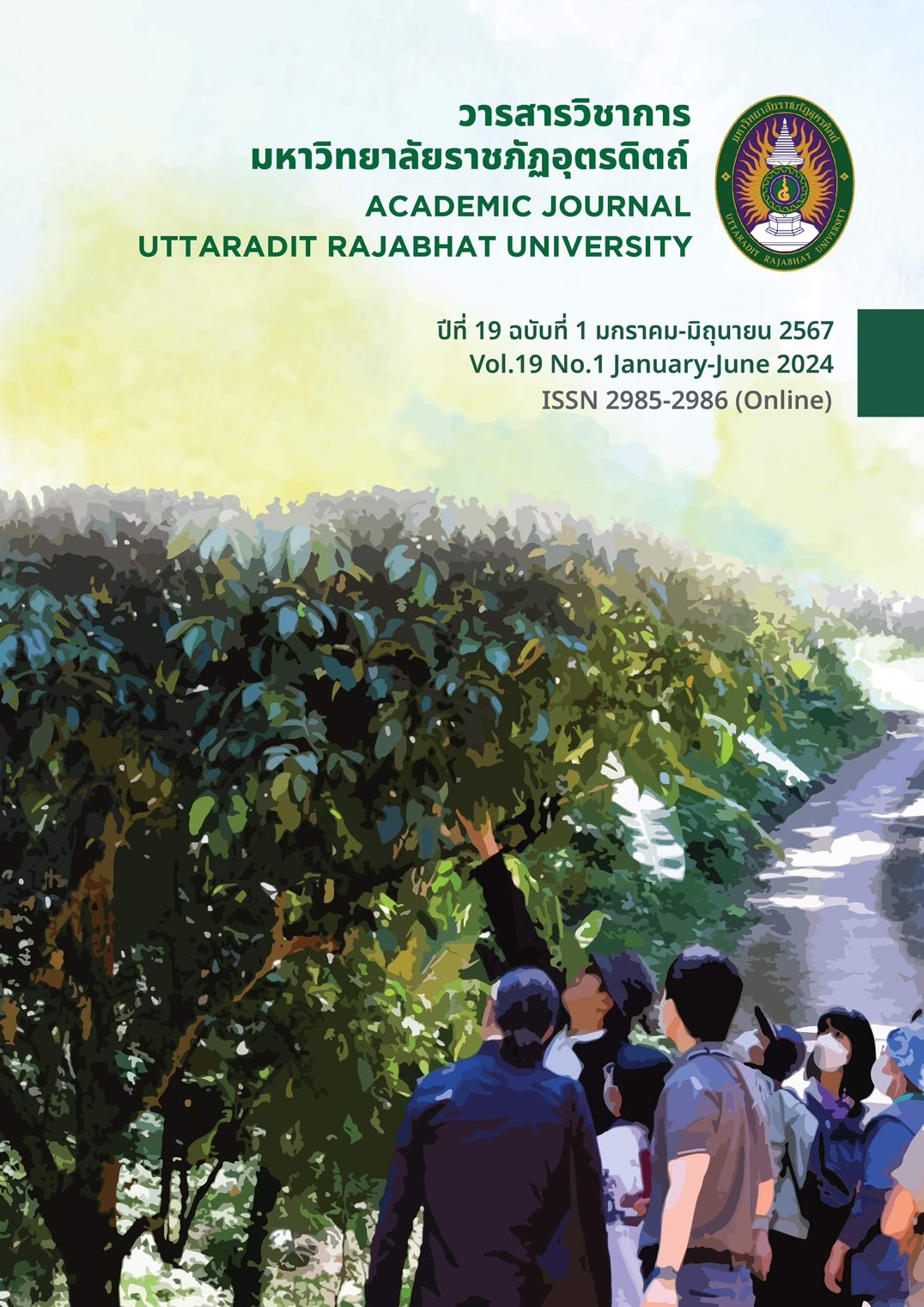ระดับความรู้ ทัศนคติ และความตระหนักของครูระดับชั้นมัธยมศึกษาที่มีต่อปัญหาบุหรี่ไฟฟ้าของเยาวชนในเขตพื้นที่กรุงเทพมหานคร และเขตพื้นที่ภาคกลางของประเทศไทย
Main Article Content
บทคัดย่อ
การวิจัยครั้งนี้ มีวัตถุประสงค์เพื่อศึกษาระดับความรู้ ทัศนคติ และความตระหนักเกี่ยวกับปัญหาของบุหรี่ไฟฟ้าในเยาวชนของครูระดับชั้นมัธยมศึกษา และศึกษาความสัมพันธ์ระหว่างความรู้ ทัศนคติ และความตระหนักต่อปัญหาของบุหรี่ไฟฟ้าในเยาวชนของครูระดับชั้นมัธยมศึกษาในเขตพื้นที่กรุงเทพมหานครและเขตพื้นที่ภาคกลางของประเทศไทย กลุ่มตัวอย่างคือ ครูระดับมัธยมศึกษา สังกัดสำนักงานคณะกรรมการการศึกษาขั้นพื้นฐาน ในเขตพื้นที่กรุงเทพมหานครและเขตพื้นที่ภาคกลาง 498 คน ด้วยวิธีการสุ่มแบบหลายขั้นตอน เครื่องมือที่ใช้ในการวิจัยคือ แบบสอบถามความรู้ ทัศนคติ และความตระหนักของครูระดับชั้นมัธยมศึกษาที่มีต่อปัญหาบุหรี่ไฟฟ้าของเยาวชน วิเคราะห์ข้อมูลโดยหาค่าร้อยละ ค่าเฉลี่ย ส่วนเบี่ยงเบนมาตรฐาน และวิเคราะห์ความสัมพันธ์ระหว่างตัวแปรความรู้ ทัศนคติ และความตระหนักด้วยสหสัมพันธ์เพียร์สัน กำหนดระดับนัยสำคัญที่ .05 ผลการวิจัยพบว่า 1) ครูมีความรู้เกี่ยวกับบุหรี่ไฟฟ้าอยู่ในระดับดี 2) ครูมีทัศนคติเชิงบวกต่อการป้องกันและแก้ไขปัญหาบุหรี่ไฟฟ้าในเยาวชน 3) ครูมีความตระหนักต่อการป้องกันและแก้ไขปัญหาบุหรี่ไฟฟ้าในเยาวชนอยู่ในระดับมาก และ 4) ความรู้ ทัศนคติ และความตระหนักต่อปัญหาของบุหรี่ไฟฟ้าในเยาวชนของครูระดับชั้นมัธยมศึกษาในเขตพื้นที่กรุงเทพมหานครและเขตพื้นที่ภาคกลางมีความสัมพันธ์กันทางบวกอย่างมีนัยสำคัญทางสถิติที่ระดับ .05 ผลการศึกษาเป็นแนวทางสำหรับครูนำไปขับเคลื่อนการป้องกันและแก้ไขปัญหาบุหรี่ไฟฟ้าให้กับเยาวชนเพื่อสร้างภูมิคุ้มกันให้กับเยาวชนซึ่งเป็นทรัพยากรบุคคลที่สำคัญของประเทศได้ตระหนักถึงผลกระทบด้านสุขภาพ เพื่อการป้องกันการเกิดนักสูบหน้าใหม่
Downloads
Article Details

อนุญาตภายใต้เงื่อนไข Creative Commons Attribution-NonCommercial-NoDerivatives 4.0 International License.
เอกสารอ้างอิง
กาญจนา เทียนลาย. (2563, เมษายน). บุหรี่ไฟฟ้าปลอดภัยจริงหรือ. รายงานสุขภาพคนไทย. https://www.thaihealthreport.com/th/articles_detail.php?id=77
ทิพยรัตน์ บุญมา, บุญวัฒน์ สว่างวงศ์, และวันจักร น้อยจันทร์. (2564). ทัศนคติของนักศึกษาต่อการสูบบุหรี่อิเล็กทรอนิกส์และบุหรี่มวน. วารสารมนุษยศาสตร์และสังคมศาสตร์ มหาวิทยาลัยพะเยา, 9(1), 202-215.
ทิพวัลย์ ธีรสิริโรจน์. (2565). การสร้างความตระหนักและส่งเสริมการปรับเปลี่ยนพฤติกรรม เพื่อลด ละ เลิกบุหรี่ในผู้ป่วยโรคไม่ติดต่อเรื้อรัง. วารสารพยาบาลศาสตร์ มหาวิทยาลัยคริสเตียน, 9(1), 97-113.
ธงชัย เลิศวินัยรัตนพงศ์. (2565, 5 กรกฎาคม). บุหรี่คร่าชีวิตคนไทย 72,000 ราย สูญมูลค่าทางเศรษฐกิจปีละกว่า2 แสนล้านบาท. กรุงเทพธุรกิจ. https://www.bangkokbiznews.com/social/1013732
นรรัชต์ ฝันเชียร. (2563, 21 เมษายน). ประโยชน์ของการฝึกอบรมครู. ทรูปลูกปัญญา. https://www.trueplookpanya.com/education/content/80328/-teaartedu-teaart-teaarttea-
บุญชัย พิริยกิจกำจร และนิรชร ชูติพัฒนะ. (2561). แนวทางการป้องกัน และลด ละ เลิกบุหรี่ของเยาวชน จังหวัดสงขลา. วารสารเครือข่ายวิทยาลัยพยาบาลและการสาธารณสุขภาคใต้, 5(1), 108-123.
ปราณี แผนดี. (2563). ผลของโปรแกรมการส่งเสริมการลดสูบบุหรี่ต่อพฤติกรรมการลดสูบบุหรี่ของนักศึกษา มหาวิทยาลัยราชภัฏกำแพงเพชร จังหวัดกำแพงเพชร. [วิทยานิพนธ์, มหาวิทยาลัยนเรศวร]. https://nuir.lib.nu.ac.th /dspace/bitstream/123456789/1731/3/60061568.pdf
ปิยวรรณ บุญเพ็ญ, ภาวนา เมนทะระ และปิยชาติ บุญเพ็ญ. (2562). พฤติกรรมการสูบบุหรี่ไฟฟ้าและพฤติกรรมต้องการเลิกบุหรี่ไฟฟ้าของนักศึกษาระดับอุดมศึกษาในเขตกรุงเทพมหานคร. วารสารศรีนครินทรวิโรฒวิจัยและพัฒนา สาขามนุษยศาสตร์และสังคมศาสตร์, 11(22), 111-127.
ผ่องศรี ศรีมรกต. (2565, 17 กันยายน). บุหรี่ไฟฟ้า : ภัยคุกคามเยาวชนทำลายสุขภาพ ทำร้ายคนรอบข้าง. มหาวิทยาลัยมหิดล. https://mahidol.ac.th/th/electronic-cigarette/
รณชัย คงสกนธ์, อนุตเชษฐ์ พัฒนธีร์ปพน, สมนึก สกุลหงส์โสภณ, อรลักษณ์ พัฒนาประทีป, ปวีณา ปั้นกระจ่าง, วศิน พิพัฒนฉัตร, บุญณัฐ บุญเชิด และจเร ทั่งโต. (2563). รายงานสถานการณ์การบริโภคยาสูบของประเทศไทย พ.ศ. 2562. ศูนย์วิจัยและจัดการความรู้เพื่อการควบคุมยาสูบ มหาวิทยาลัยมหิดล.
วิชุดา กาพล และพีระศักดิ์ วรฉัตร. (2564). โปรแกรมการพัฒนาครูด้านการจัดการเรียนรู้ที่เน้นทักษะการคิดวิเคราะห์ สำหรับสถานศึกษา สังกัดสำนักงานเขตพื้นที่การศึกษาประถมศึกษาชัยภูมิ เขต 2. Journal of Modern Learning Development, 6(1), 90–102.
ศิริพร พูลรักษ์. (2565). ผลของโปรแกรมการเลิกสูบบุหรี่ไฟฟ้าผ่านระบบออนไลน์ที่มีต่อความรู้ ทัศนคติ และความตั้งใจเลิกสูบบุหรี่ของนักศึกษามหาวิทยาลัยเอกชนแห่งหนึ่ง. วารสารพยาบาลศาสตร์ มหาวิทยาลัยคริสเตียน. 9(1), 20-38.
สถาบันวิจัยประชากรและสังคม มหาวิทยาลัยมหิดล. (2565, กันยายน). บุหรี่ไฟฟ้า. รายงานสุขภาพคนไทย. https://www.thaihealthreport.com/th/articles_detail.php?id=139
สถาบันวิจัยประชากรและสังคม มหาวิทยาลัยมหิดล. (2566, กุมภาพันธ์). บุหรี่ไฟฟ้าทางเลือกที่อันตรายไม่น้อยไปกว่าบุหรี่. รายงานสุขภาพคนไทย. https://www.thaihealthreport.com/th/articles_detail.php?id=163
สำนักงานกองทุนสนับสนุนการสร้างเสริมสุขภาพ. (2562, 13 ธันวาคม). เครือข่ายต้านบุหรี่ หนุนควบคุมบุหรี่ไฟฟ้า. https://www.thaihealth.or.th/?p=221038
สำนักงานกองทุนสนับสนุนการสร้างเสริมสุขภาพ. (2563, 27 มีนาคม). ข้อเท็จจริงของบุหรี่ไฟฟ้า. https://resourcecenter.thaihealth.or.th/media/y4Qg
สำนักงานสถิติแห่งชาติ. (2564). การสำรวจพฤติกรรมด้านสุขภาพของประชากร พ.ศ. 2564. สำนักงานสถิติแห่งชาติ กระทรวงดิจิทัลเพื่อเศรษฐกิจและสังคม.
สุรสิงห์ สมบัติ, สุรนาถ วัชวงศ์, และณัฐฏ์พัชรสร สมบัติ. (2564). การแก้ปัญหานักสูบหน้าใหม่ ความท้าทายในสังคมไทย. วารสารโรงพยาบาลนครพิงค์, 12(1), 205-222.
องค์การอนามัยโลก. (2564, 20 ตุลาคม). แถลงการณ์เรื่องบุหรี่ไฟฟ้า. https://cdn.who.int/media/docs/default-source/thailand/ncds/who-thailand-statement-on-electronic-cigarettes-as-of-20-october-2021-(th).pdf?sfvrsn=56366162_5
อัฐภิญญา ปัทมภาสสกุล. (2562). ปัจจัยความตระหนักเรื่องสิ่งแวดล้อม สุขภาพ รูปลักษณ์ภายนอก ความรู้เรื่องนิเวศวิทยา และอิทธิพล ระหว่างบุคคลที่ส่งผลต่อทัศนคติ และความตั้งใจซื้อเครื่องสำอางธรรมชาติของสตรี ในกรุงเทพมหานคร. [การค้นคว้าอิสระ, มหาวิทยาลัยกรุงเทพ].http://dspace.bu.ac.th/bitstream/123456789/3962/1/auttapinya.patt.pdf
Al-Balas, H. I., Al-Balas, M., Al-Balas, H., Almehaiza, S., Melhem, H. B., & Al-Balas, B. (2021). Electronic Cigarettes Prevalence and Awareness Among Jordanian Individuals. Journal of Community Health, 46, 587-590. https://doi.org/10.1007/s10900-020-00904-x
Fang, J., Ren, J., Ren, L., Max, W., Yao, T., & Zhao, F. (2022). Electronic cigarette knowledge, attitudes and use among students at a university in Hangzhou, China. Tobacco Induced Diseases, 20, 9. https://doi.org/10.18332/tid/144230
Gaiha, S. M., Duemler, A., Silverwood, L., Razo, A., Halpern-Felsher, B., & Walley, S. C. (2021). School-based e-cigarette education in Alabama: Impact on knowledge of e-cigarettes, perceptions and intent to try. Addictive Behaviors, 112, 106519. https://doi.org/10.1016/j.addbeh.2020.106519
Mahamad Sobri, M., Azlan, A., Md. Bohari, N., Mohd Radzi, N., & Bakri, N. (2022). Knowledge, attitude and perceived harm of e-cigarette use behaviour among medical and dental undergraduate students in UiTM. Compendium of Oral Science, 9(2), 69-79. https://doi.org/10.24191/cos.v9i2.19235
Pender, N. J. (1996). Health promotion in nursing practice. (3rd ed.). Appleton & Lange.
Puharić, Z., Smola, V., Žulec, M., Grabovac, S., Puharić, F., & Petričević, N. (2021). Knowledge, Attitudes and use of e-cigarettes. Archives of Psychiatry Research: An International Journal of Psychiatry and Related Sciences, 57(1), 5-14. https://doi.org/10.20471/may.2021.57.01.01
Shehata, S. F., Alqahtani, F. A. M., Alzahrani, A. A., Alasmre, F. A., AlGhris, N. A. N., Al-Mudhi, M. M., & Almutlaq, A. H. (2020). Awareness, attitude, and practice regarding E-cigarettes among students at King Khalid University, Saudi Arabia. World Family Medicine Journal, 18(2), 139-145. https://doi.org/10.5742/MEWFM.2020.93921
Thongsutt, T., Yusote, C., Jubprang, S., Sasisuwan, A., Poonchuay, N., Chanawong, A., Sottiyotin, T., Laopaiboonkun, S., & Muthanna, F. M. S. (2023). Factors associated with knowledge and attitude towards E-Cigarettes among undergraduate students in thailand: A cross-sectional study. Asian Pacific Journal of Cancer Prevention, 24(2), 559–567. https://doi.org/10.31557/APJCP.2023.24.2.559
Wang, W., Lu, M., Cai, Y., & Feng, N. (2020). Awareness and use of e-cigarettes among university students in Shanghai, China. Tobacco Induced Diseases, 18, 76. https://doi.org/10.18332/tid/125748
World Health Organization. (2021, 17 August). WHO report on the global tobacco epidemic, 2021: addressing new and emerging products: executive summary. https://www.who.int/publications/i/item/9789240032842


